Kantada: The Musical Soul of Kefalonia
From fishermen’s chants to moonlit serenades,...
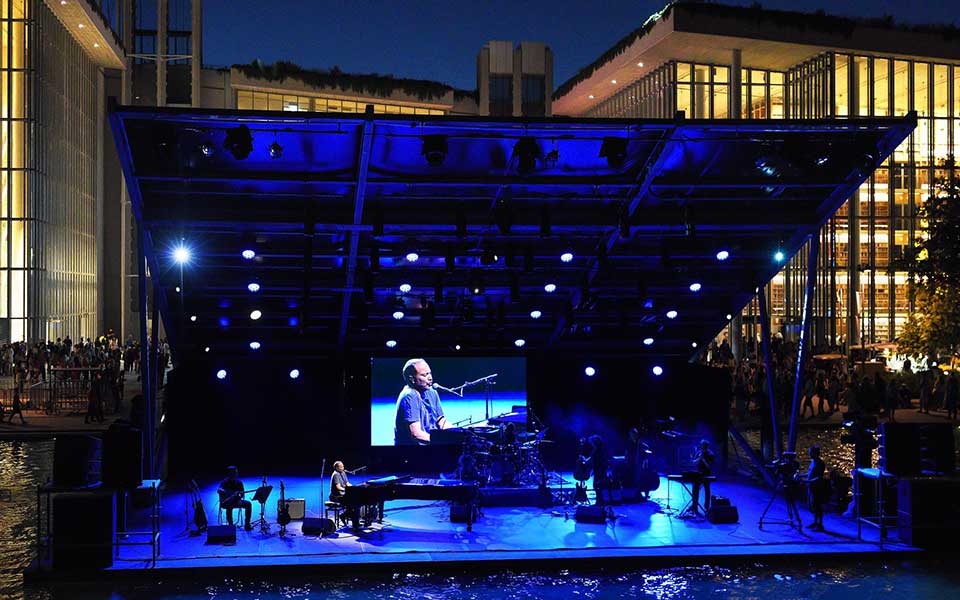
Summer Nostos Festival, at SNFCC Athens.
© Stavros Charisopoulos
A B.E.S.T. scholarship first took Pericles Kanaris from Athens to Berklee College of Music, where he received the Barnes and Noble Award and the Soren Christensen Award for outstanding musicianship. Throughout his life, his unadulterated passion for music has driven him to collaborate with major personalities who have directed and motivated him to formulate his own singular musical presence, described by the International New York Times as “a Greek identity with global sounds.”
Since 2000, he has brought Greek music to the US through a variety of highly successful initiatives, including live performances by his band Synolon. His debut album “Aoratos”, released in 2014, is a compilation of his original songs based on verses by celebrated poet Manos Eleftheriou, who offered seven unpublished poems especially to him. He performed these compositions as well as other original scores in 2019 at the Nostos Festival in Athens with great aplomb, before returning to New York to teach the course “Songs of the Underdog: American Blues meets Greek Rebetiko” at New York University (NYU). In this interview, he talks about his inspiration, the profound and cohesive influences of Greece and New York on his life and work, and his upcoming plans.
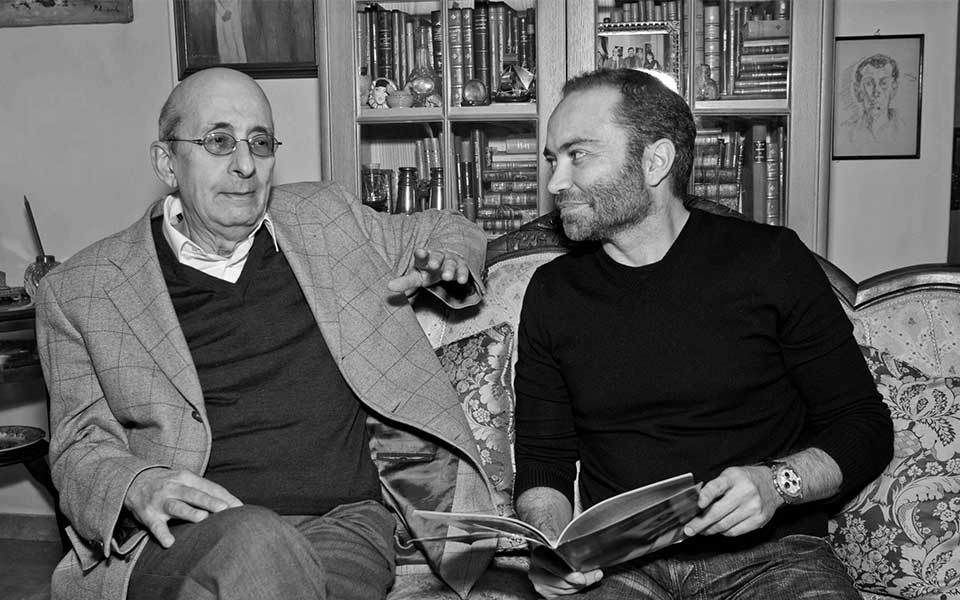
Pericles Kanaris with famed Greek poet, lyricist and prose writer, Manos Eleftheriou.
© Stavros Charisopoulos
How would you like the world to know you?
I would call myself a truth seeker, in both life and art. I highly value emotional intelligence, so notions such as sincerity and fairness resonate deeply with me. Over the years, my natural tendency towards these values was reinforced by my academic work on the philosophy of music. I developed a paramount regard for the notion of authenticity and it eventually became a compass for me as an artist as well.
What drew you to music to begin with?
My very being drew me to music. My parents are both very musical, especially my mother, who has a beautiful voice. According to their stories, as a baby I was singing before I could speak. I would climb on chairs and start singing at any given opportunity. This evolved into a real passion as I exposed myself to more musical experiences. It was all fine until I became a teenager and announced to my family that I want to make a career out of music. It took a lot of time and energy to convince them that this was much more than a teenage obsession.
In what ways did your passion for music evolve as you grew up?
The first time I ever put my hands on a piano was a seminal event. A piano teacher happened to be present and told my parents that she recognized a talent worth exploring. The discovery of music styles came in various waves as I was growing up. Radio, records and concerts brought a mix of Greek, English, French and American music to my ears. At the same time, I was being exposed to choir music and Byzantine hymns through school, while studying classical music at the conservatory. My formal music education concluded with studies in composition for film at Berklee College of Music, a world-renowned pioneer in Jazz and contemporary music education.
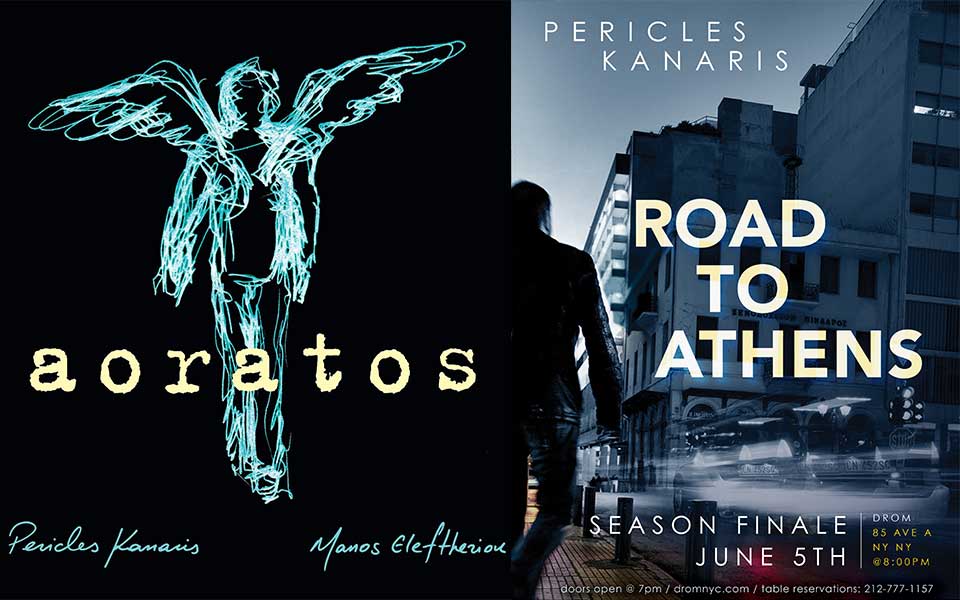
Left: "Aoratos" CD cover. Right: "Road to Athens" Concert Poster
Why did you choose to move to New York instead of staying put in Athens?
Going back to my quest for authenticity, I wanted to get to the very source of the international sounds I was drawn to, beyond the Greek ones that I had grown up with. I wanted to feel their vibrations firsthand and I knew that for this experience, New York was the place to be.
How was it for you once you moved to NY?
Overwhelming. I remember feeling a constant rush – like a pendulum swinging between “I can do anything here” and “what the hell am I doing here?!” There is a Greek expression about the “ignorance of danger.” I took a chance that in retrospect might seem precarious, but I don’t regret it for a minute.
What kickstarted your career there?
My first order of business was to earn a living in a very demanding city. Within days of moving there, I landed a job as a lead singer in the most well-known Greek music venue in Manhattan. This lasted for nine months and gave its way to my first gig as a composer, for a computer graphics animation studio. From the start, my key focus was finding the right “ingredients” so I could eventually create, perform and showcase my original music.
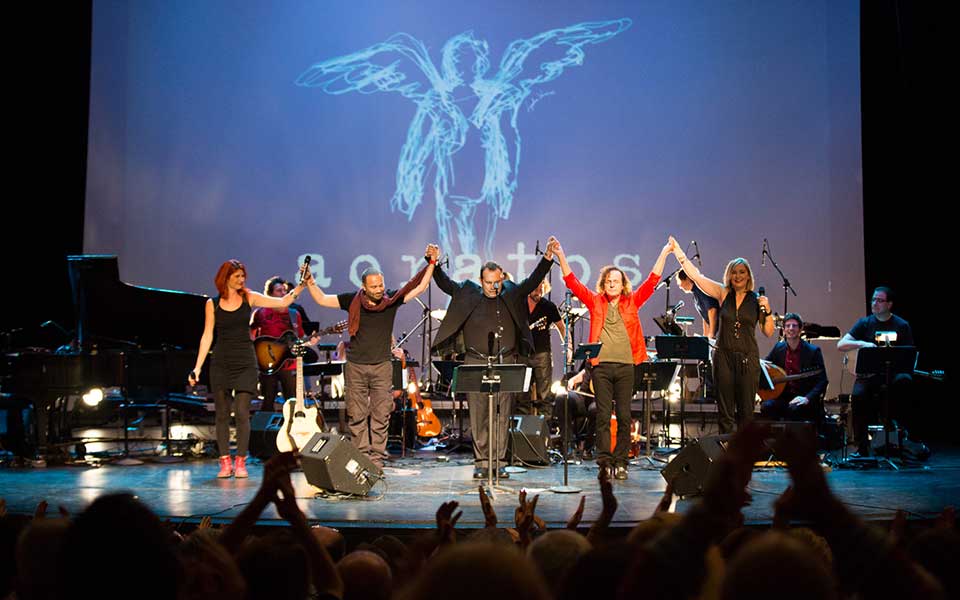
Tribeca Performing Arts Center, New York City
© Yoon Kim
What are the most key moments of your life so far?
Professionally, there were various moments when my work was recognized by people and institutions in the arts for whom I had high regard. I will never forget the overwhelming emotion of opening my NY mailbox to unexpectedly find lyrics sent by my favorite Greek lyricist, Manos Eleftheriou. But the first time I performed my music before a NY audience and experienced the energy of this interaction, was an equally important moment. In my personal life, the two most important moments were committing to starting a family and then actually becoming a father.
What inspires you most about Greece?
Greece has a unique effect on my senses and psyche. The most unexpected moments can trigger inspiration but if I had to choose, it is being close to the sea that inspires me the most – it’s where my soul feels most alive. Of course, inspiration can come at any time from personal relationships and the emotions they evoke. Composing then becomes a form of therapy, of psychological catharsis.
What was the main inspiration behind the music you performed at the Nostos Festival at the Stavros Niarchos Center?
After setting music to the poetry of Manos Eleftheriou, I sought challenge and inspiration from classic poets such as Konstantine Cavafy and T.S. Eliot but also from contemporary poets such as Dimitris Papacharalampous, with whom I collaborated on two new songs. At the Nostos Festival I also performed songs which I wrote myself in French and English, inspired by personal stories. I can’t wait to perform these songs again. Covid hit just when I had started sharing them. I was also planning to record a second album based on this material. I really look forward to being able to return to performing and recording.
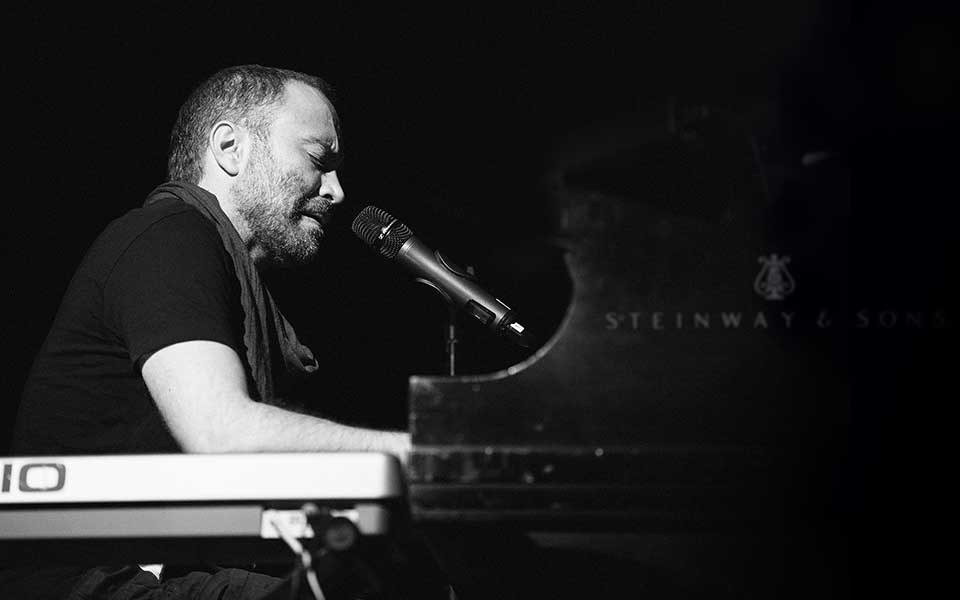
Performing at the Tribeca, NYC
© Yoon Kim
Please tell me about your course at NYU, “American Blues meets Greek Rebetiko”
The initial idea belonged to Consul General of Greece in New York, Dr. Konstantinos Koutras. He invited me to create a cultural bridge between the US and Greece and I undertook the task of creating an academic course which compares Rebetika to the Blues. It was a fascinating journey for me because it gave me the opportunity to discover that the similarities of these two genres had much more to tell us about the human condition than their differences.
What would be your dream performance scenario?
I must say that after years of exploring, I feel blessed to have put together my “dream team” on stage and the studio. Of course, exploration never stops and I would love an opportunity to co-produce with people such as The Edge from U2, or perform with musicians such Yo-Yo Ma. The Odeon of Herodes Atticus, under the Acropolis, remains the dream performance setting for me.
What would you wish to see more/less of in Greece in terms of the current music scene?
Greece has an abundance of great musical talent – music is ingrained in the Greek DNA. In terms of music education, the system relies heavily on traditional curricula. It would be great to see more contemporary idioms entering this equation. As for the Greek music scene, I hope to see the country foster more platforms for allowing independent artists to showcase their work without subjecting them to the limitations of any system based on public relations. This in turn can fuel musical diversity and raise the quality bar for the next generations.
From fishermen’s chants to moonlit serenades,...
From hip-hop to hybrid folk, these...
A summer mix of cultural events...